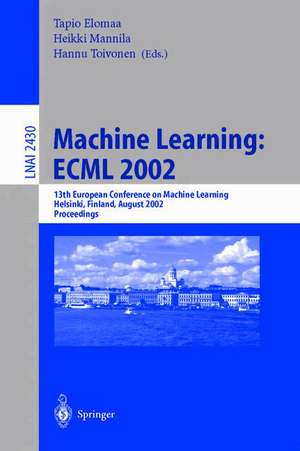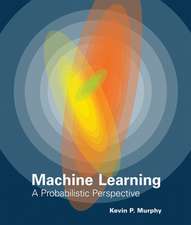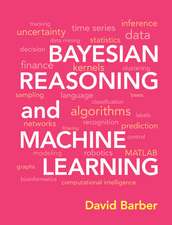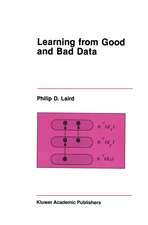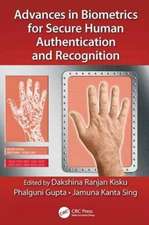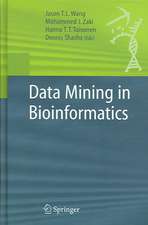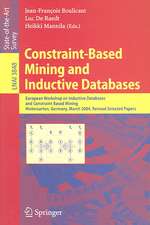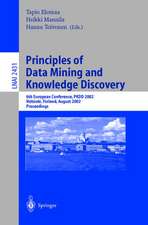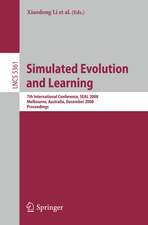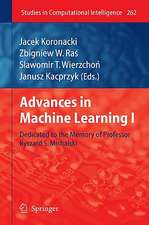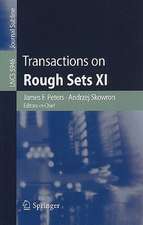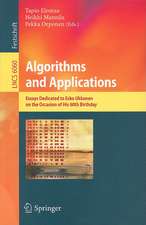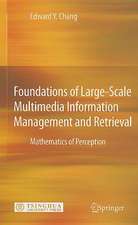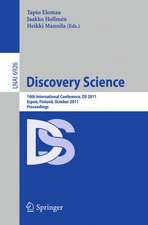Machine Learning: ECML 2002: 13th European Conference on Machine Learning, Helsinki, Finland, August 19-23, 2002. Proceedings: Lecture Notes in Computer Science, cartea 2430
Editat de Tapio Elomaa, Heikki Mannila, Hannu Toivonenen Limba Engleză Paperback – 5 aug 2002
The 41 revised full papers presented together with 4 invited contributions were carefully reviewed and selected from numerous submissions. Among the topics covered are computational discovery, search strategies, Classification, support vector machines, kernel methods, rule induction, linear learning, decision tree learning, boosting, collaborative learning, statistical learning, clustering, instance-based learning, reinforcement learning, multiagent learning, multirelational learning, Markov decision processes, active learning, etc.
Din seria Lecture Notes in Computer Science
- 20%
 Preț: 1061.55 lei
Preț: 1061.55 lei - 20%
 Preț: 307.71 lei
Preț: 307.71 lei - 20%
 Preț: 438.69 lei
Preț: 438.69 lei - 20%
 Preț: 645.28 lei
Preț: 645.28 lei -
 Preț: 410.88 lei
Preț: 410.88 lei - 15%
 Preț: 580.46 lei
Preț: 580.46 lei - 17%
 Preț: 427.22 lei
Preț: 427.22 lei - 20%
 Preț: 596.46 lei
Preț: 596.46 lei -
 Preț: 449.57 lei
Preț: 449.57 lei - 20%
 Preț: 353.50 lei
Preț: 353.50 lei - 20%
 Preț: 1414.79 lei
Preț: 1414.79 lei - 20%
 Preț: 309.90 lei
Preț: 309.90 lei - 20%
 Preț: 583.40 lei
Preț: 583.40 lei - 20%
 Preț: 1075.26 lei
Preț: 1075.26 lei - 20%
 Preț: 310.26 lei
Preț: 310.26 lei - 20%
 Preț: 655.02 lei
Preț: 655.02 lei - 20%
 Preț: 580.93 lei
Preț: 580.93 lei - 20%
 Preț: 340.32 lei
Preț: 340.32 lei - 18%
 Preț: 938.83 lei
Preț: 938.83 lei - 20%
 Preț: 591.51 lei
Preț: 591.51 lei - 15%
 Preț: 438.59 lei
Preț: 438.59 lei - 20%
 Preț: 337.00 lei
Preț: 337.00 lei -
 Preț: 389.48 lei
Preț: 389.48 lei - 20%
 Preț: 607.39 lei
Preț: 607.39 lei - 20%
 Preț: 1024.44 lei
Preț: 1024.44 lei - 20%
 Preț: 579.30 lei
Preț: 579.30 lei - 20%
 Preț: 763.23 lei
Preț: 763.23 lei - 20%
 Preț: 453.32 lei
Preț: 453.32 lei - 20%
 Preț: 575.48 lei
Preț: 575.48 lei - 20%
 Preț: 585.88 lei
Preț: 585.88 lei - 20%
 Preț: 825.93 lei
Preț: 825.93 lei - 20%
 Preț: 763.23 lei
Preț: 763.23 lei - 17%
 Preț: 360.19 lei
Preț: 360.19 lei - 20%
 Preț: 1183.14 lei
Preț: 1183.14 lei - 20%
 Preț: 340.32 lei
Preț: 340.32 lei - 20%
 Preț: 504.57 lei
Preț: 504.57 lei - 20%
 Preț: 369.12 lei
Preț: 369.12 lei - 20%
 Preț: 583.40 lei
Preț: 583.40 lei - 20%
 Preț: 343.62 lei
Preț: 343.62 lei - 20%
 Preț: 350.21 lei
Preț: 350.21 lei - 20%
 Preț: 764.89 lei
Preț: 764.89 lei - 20%
 Preț: 583.40 lei
Preț: 583.40 lei - 20%
 Preț: 649.49 lei
Preț: 649.49 lei - 20%
 Preț: 341.95 lei
Preț: 341.95 lei - 20%
 Preț: 238.01 lei
Preț: 238.01 lei - 20%
 Preț: 538.29 lei
Preț: 538.29 lei
Preț: 344.93 lei
Preț vechi: 431.16 lei
-20% Nou
Puncte Express: 517
Preț estimativ în valută:
66.00€ • 69.10$ • 54.61£
66.00€ • 69.10$ • 54.61£
Carte tipărită la comandă
Livrare economică 07-21 aprilie
Preluare comenzi: 021 569.72.76
Specificații
ISBN-13: 9783540440369
ISBN-10: 3540440364
Pagini: 548
Ilustrații: XIV, 538 p.
Dimensiuni: 155 x 233 x 29 mm
Greutate: 0.76 kg
Ediția:2002
Editura: Springer Berlin, Heidelberg
Colecția Springer
Seriile Lecture Notes in Computer Science, Lecture Notes in Artificial Intelligence
Locul publicării:Berlin, Heidelberg, Germany
ISBN-10: 3540440364
Pagini: 548
Ilustrații: XIV, 538 p.
Dimensiuni: 155 x 233 x 29 mm
Greutate: 0.76 kg
Ediția:2002
Editura: Springer Berlin, Heidelberg
Colecția Springer
Seriile Lecture Notes in Computer Science, Lecture Notes in Artificial Intelligence
Locul publicării:Berlin, Heidelberg, Germany
Public țintă
ResearchCuprins
Contributed Papers.- Convergent Gradient Ascent in General-Sum Games.- Revising Engineering Models: Combining Computational Discovery with Knowledge.- Variational Extensions to EM and Multinomial PCA.- Learning and Inference for Clause Identification.- An Empirical Study of Encoding Schemes and Search Strategies in Discovering Causal Networks.- Variance Optimized Bagging.- How to Make AdaBoost.M1 Work for Weak Base Classifiers by Changing Only One Line of the Code.- Sparse Online Greedy Support Vector Regression.- Pairwise Classification as an Ensemble Technique.- RIONA: A Classifier Combining Rule Induction and k-NN Method with Automated Selection of Optimal Neighbourhood.- Using Hard Classifiers to Estimate Conditional Class Probabilities.- Evidence that Incremental Delta-Bar-Delta Is an Attribute-Efficient Linear Learner.- Scaling Boosting by Margin-Based Inclusion of Features and Relations.- Multiclass Alternating Decision Trees.- Possibilistic Induction in Decision-Tree Learning.-Improved Smoothing for Probabilistic Suffix Trees Seen as Variable Order Markov Chains.- Collaborative Learning of Term-Based Concepts for Automatic Query Expansion.- Learning to Play a Highly Complex Game from Human Expert Games.- Reliable Classifications with Machine Learning.- Robustness Analyses of Instance-Based Collaborative Recommendation.- iBoost: Boosting Using an instance-Based Exponential Weighting Scheme.- Towards a Simple Clustering Criterion Based on Minimum Length Encoding.- Class Probability Estimation and Cost-Sensitive Classification Decisions.- On-Line Support Vector Machine Regression.- Q-Cut—Dynamic Discovery of Sub-goals in Reinforcement Learning.- A Multistrategy Approach to the Classification of Phases in Business Cycles.- A Robust Boosting Algorithm.- Case Exchange Strategies in Multiagent Learning.- Inductive Confidence Machines for Regression.- Macro-Operators in Multirelational Learning: A Search-Space Reduction Technique.- Propagation of Q-values in Tabular TD(?).- Transductive Confidence Machines for Pattern Recognition.- Characterizing Markov Decision Processes.- Phase Transitions and Stochastic Local Search in k-Term DNF Learning.- Discriminative Clustering: Optimal Contingency Tables by Learning Metrics.- Boosting Density Function Estimators.- Ranking with Predictive Clustering Trees.- Support Vector Machines for Polycategorical Classification.- Learning Classification with Both Labeled and Unlabeled Data.- An Information Geometric Perspective on Active Learning.- Stacking with an Extended Set of Meta-level Attributes and MLR.- Invited Papers.- Finding Hidden Factors Using Independent Component Analysis.- Reasoning with Classifiers.- A Kernel Approach for Learning from almost Orthogonal Patterns.- Learning with Mixture Models: Concepts and Applications.
Caracteristici
Includes supplementary material: sn.pub/extras
